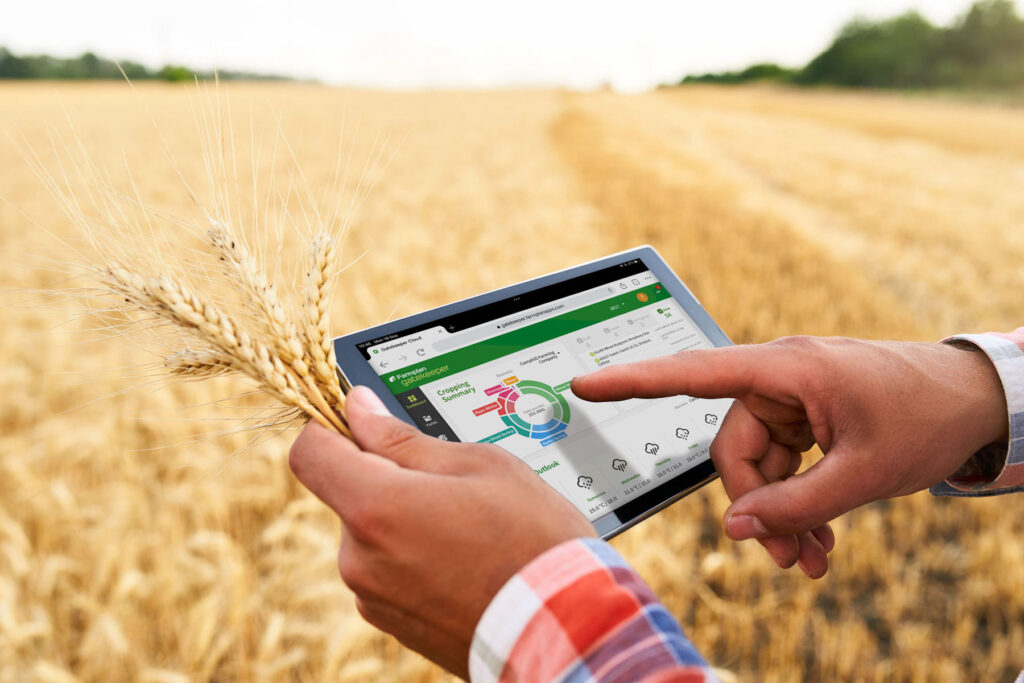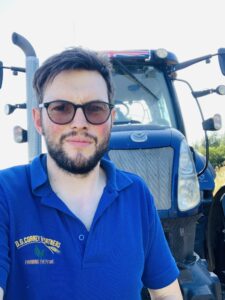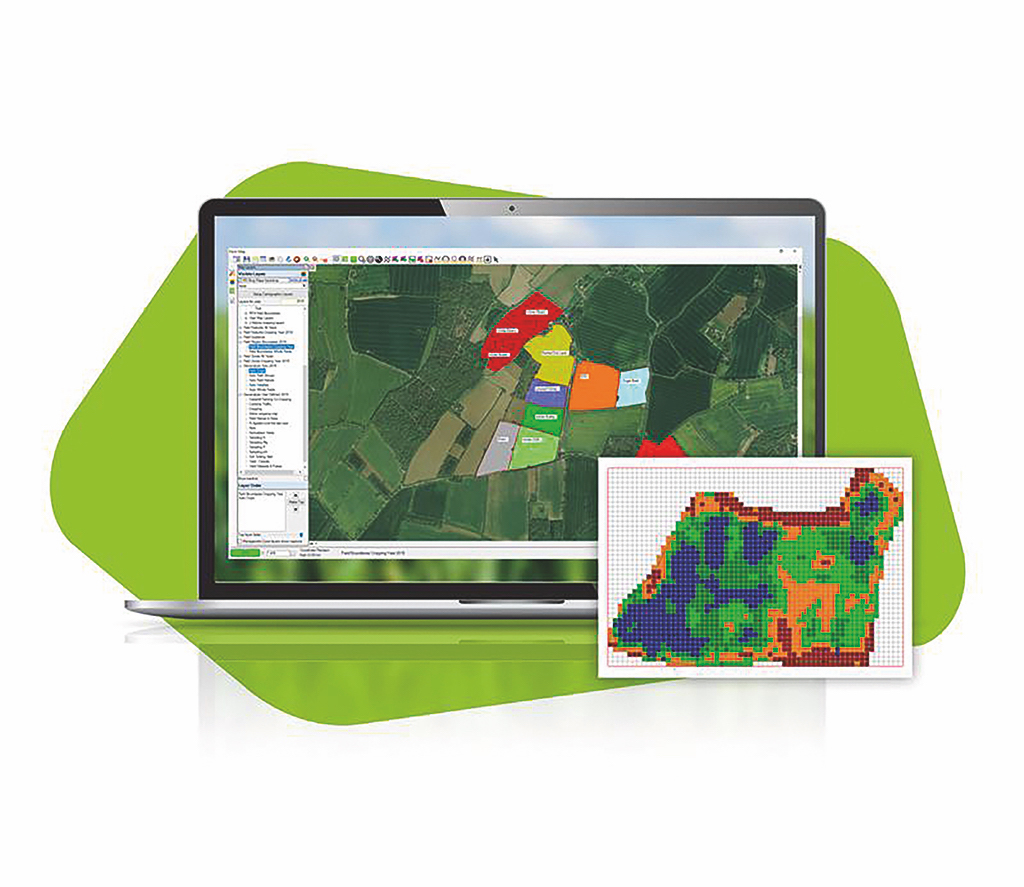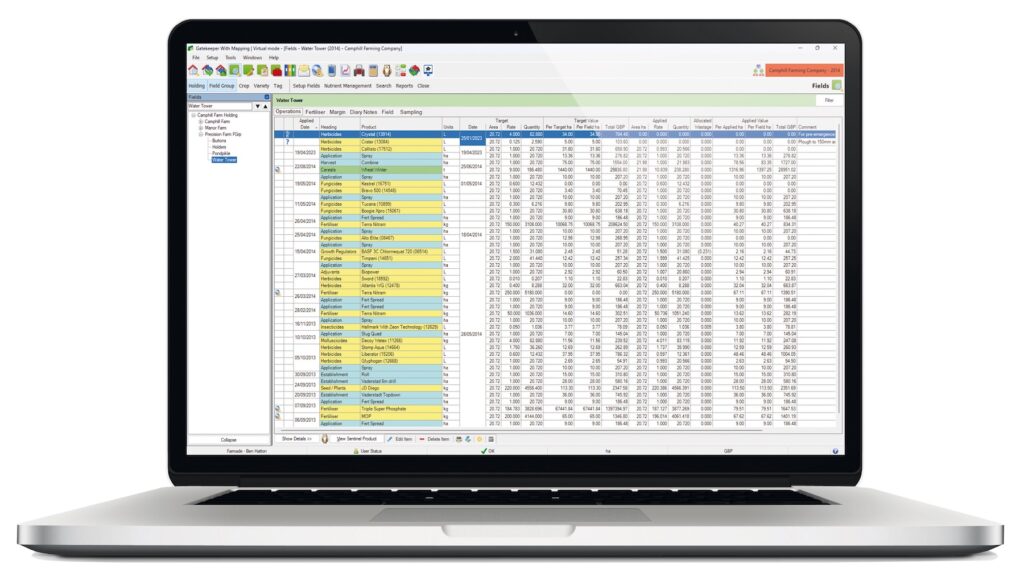East Anglian farmer uses data to save time and money
30th October 2023
Fifth generation arable farmer Tristan Corney began looking at ways to make his 340-acre farm near Peterborough more sustainable, after realising that his conventional farming practices were not generating enough of a return. Adopting a new system allowing him to record data on the go has reaped a number of benefits for the farm…

Tristan’s father took over the farm in the 1970s. Back then, everything was recorded on paper, in diaries and while this was undoubtably important and useful, it was difficult to spot patterns easily, find documents, or carry out any kind of meaningful analysis of the business.
Recording data manually also proves particularly laborious after a long day out in the field.
Meaningful analysis allows farmers to analyse the cost of farming in a particular way, as well as what’s working, what isn’t, and how to run a more sustainable business.
In Tristan’s case, when he looked at the numbers he’d recorded over the last two years, he realised that his conventional farming practices weren’t generating enough of a return. This prompted him to look at ways he could make the farm more sustainable.

Climate friendly farming
The East Anglian farm grows winter wheat, barley, peas, spring linseed, and spring oilseed rape on organic peaty soils.
Tristan is keen to adopt climate-friendly farming practices. His move towards sustainability includes looking at how resilient his land is in a conventional system versus a more natural regenerative system. For example, he has ploughed some fields and not others, and he is being careful to not over cultivate the land.
As his farm is located in The Fens, an area with naturally peaty organic soils, he maintains balance by avoiding overuse of ag chemicals. He has also studied soil health extensively, and looking after the soil is a key part of his move towards regenerative agriculture. It’s also something he feels has been lost after many years of conventional intensive farming practices.
Evolving to meet these challenges doesn’t happen overnight. Tristan’s agronomist presented him with a possible solution in Gatekeeper. The agronomist fully supported the use of Gatekeeper and was familiar with the system, so it seemed like a straightforward choice to adopt it.
Though Tristan admits that he struggled to understand it at first, once he got to grips with it and began to understand what it could do for his business, he realised that there could be considerable benefits.
Recording data on the go
Gatekeeper has helped Tristan record data on the go, and all in one place. Rather than trying to find what he has recorded on bits of paper here and there, with Gatekeeper he can find out exactly what he needs to know. An example he gives is that he can look at the rates of inputs he applied last year and plan for whether this year’s crop needs the same rate. This is a far quicker process which gives him the flexibility he needs.
Using Gatekeeper Web Apps has also saved him a lot of time in that he can see job data and complete tasks on the go. Tristan says he can look at data wherever and whenever he needs to, rather than having to go back and log everything on a computer at the end of a long day.
Thanks to Gatekeeper Web Apps, the process is seamless. Whether he’s recording field notes or inspecting a field, he can simply input his data, then it’s fed back into Gatekeeper for easy access next time he needs to refer to it.
Having the farm data all in one place also makes analysis easier. Tristan uses Gatekeeper’s mapping system and enters soil sample data to get a clearer picture of what’s going on and to help him make the right decision for each crop.
He has achieved considerable cost-savings in a few ways. Firstly, he’s been able to take on crop recording himself rather than paying a third party, and secondly, being able to work out rates from one year to the next has enabled him to save money on inputs across the board.

The regen ag route
When it comes to helping Tristan take his farm business down a more sustainable route, he says Gatekeeper has been instrumental in helping him make those key decisions. It enabled him to consider adopting a regenerative ag route instead of carrying on with conventional farming, as well as using soil analysis and mapping to keep track of how healthy his fields really are.
“I want to be more sustainable, and putting all the costings into Gatekeeper allowed me to see that going down a more climate-friendly farming route was possible.”
It also helped him to realise that the farm couldn’t carry on in the way it had done in the past, the return on investment was just too low. Through using data from Gatekeeper, he says he has been able to evolve and pursue a more sustainable strategy.
Tristan comments: “Using Gatekeeper, Gatekeeper Web Apps, and Mapping lets me record and look at my data wherever and whenever I need to. It saves time and it gives me the flexibility that I love.
“I’ve cut costs, I can see where I’m improving and what needs to improve, and I’m excited about a more sustainable future. I’ve done it my way, with Gatekeeper’s help,” he concludes.

The benefits
Farmplan explains the benefits of Gatekeeper for farms of all sizes:
- Added value for farm businesses of any size: Rather than being a ‘big farm’ tool that is expensive and difficult to learn for smaller farm businesses, Tristan’s results, and the benefits he has gained demonstrate that it can add a huge amount of value to businesses of any size, says Farmplan.
- Significant cost-savings: Cost-savings brought about by tools like mapping and soil analysis as well as by eliminating the need to hire third parties for crop recording can be significant for all types of farm business.
- Improved efficiency, transparency, and compliance: Using web apps also improve efficiency and transparency, as well as enabling data recording on the go.
- Customers can produce instant reports from field audits and stock, to nutrient management, and health and safety. Add to this the ability to monitor stock and produce, record yields, view sales and contracts, and keep track of deliveries to and from the farm, and you can see how Gatekeeper also plays an important role in helping with compliance and meeting legislative requirements.
- Better connection equals transformation: From Farmplan customer testimonials, a few themes emerge when they are asked them about their experiences using Gatekeeper – connection and transformation. The platform allows for seamless connection with key partners like agronomists and with farm machinery. It also transforms farm businesses of any size by integrating cropping activities and giving customers the bigger picture view.
